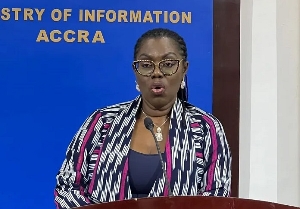Opinions of Friday, 16 February 2024
Columnist: Mileba Godwin Kwame
Female sex trade in Ghana also known as ‘Hook Up’ - Its effect on the girl child education
The female sex trade, commonly referred to as "hooking up" or engaging in commercial sex work, can have significant negative effects on the education of girls in Ghana and elsewhere.
The term "hook up" is more commonly used to describe casual sexual encounters rather than commercial sex work. However, commercial sex work does exist in Ghana, as in many other countries, and it can have significant implications for the individuals involved.
In Ghana, commercial sex work often occurs in urban areas, including cities like Accra, Kumasi, and Takoradi but has now spread to the towns and rural areas in the country, as well as along major transportation routes. Women and girls may engage in sex work for various reasons, including economic necessity, lack of other viable employment options, or coercion by traffickers or pimps.
The female sex trade in Ghana, like elsewhere, presents complex challenges and risks. Women and girls involved in sex work are often vulnerable to exploitation, violence, sexually transmitted infections (STIs), and unintended pregnancies. Additionally, engagement in sex work can carry social stigma and discrimination, affecting individuals' mental health and overall well-being.
Efforts to address the issue of commercial sex work in Ghana require a comprehensive approach that includes addressing the underlying factors driving women and girls into the sex trade. This may involve strategies such as providing economic opportunities, education, healthcare, and social support services to vulnerable individuals. Additionally, efforts to combat human trafficking and protect the rights of sex workers are essential components of any comprehensive response to the issue.
Here are some ways in which this phenomenon impacts the girl child's education
Disruption of education: Girls who engage in commercial sex work often prioritize earning money over attending school regularly. This can lead to frequent absences, dropouts, or disengagement from the education system altogether, hindering their academic progress and future prospects.
Vulnerability to exploitation: Girls involved in the sex trade are vulnerable to exploitation, abuse, and coercion by clients, pimps, or traffickers. This exploitation can result in physical and psychological harm, further undermining their ability to focus on their education and pursue their aspirations.
Health risks: Engaging in commercial sex work exposes girls to various health risks, including sexually transmitted infections (STIs), HIV/AIDS, unwanted pregnancies, and substance abuse. These health issues can disrupt their education and limit their future opportunities for personal and professional growth.
Stigma and discrimination: Girls involved in the sex trade often face stigma, discrimination, and social ostracism from their peers, teachers, and community members. This negative social perception can contribute to feelings of shame, low self-esteem, and isolation, making it difficult for them to participate fully in school activities and engage with their education.
Cycle of poverty: Commercial sex work can perpetuate a cycle of poverty for girls and their families. Instead of investing in their education and prospects, girls may become trapped in a cycle of exploitation and economic hardship, with limited opportunities for upward mobility.
Addressing the root causes of the female sex trade in Ghana requires a multi-faceted approach that involves addressing systemic issues such as poverty, gender inequality, lack of access to education and economic opportunities, and social stigma. Providing girls with access to quality education, vocational training, economic empowerment programs, and support services can help prevent their involvement in commercial sex work and empower them to build better futures for themselves.
Additionally, efforts to raise awareness, promote gender equality, and strengthen child protection systems are essential for creating an environment where girls can thrive and pursue their education free from exploitation and harm.













